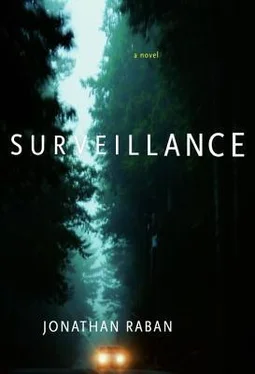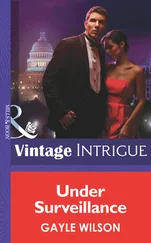But Lucy had to hide her anger. “Rabbit, it’s really important to me that we go together.”
“I don’t want to.”
“Try and tell me why.”
In a small voice, Alida said, “It’s because like…I think it might hurt Tad’s feelings.”
“Is that what he said?”
“No. It doesn’t have anything to do with what Tad said. It’s just how I feel.”
“Oh, Rabbit.” There was candid misery in Alida’s face now. “I promise you it won’t hurt Tad. Would it help if I talked to him?”
“No.”
“This is a you-and-me thing. We just can’t back out now.” Cradling her daughter, she remembered how, at her age, she’d felt physically torn apart in the intermittent Cold War between her parents. Her great ambition had always been to protect Alida from anything like that, and now Alida was suffering exactly as she had done.
“Is it really super-important?”
“Yes, but…” That but was the crucial word. Lucy realized that Alida had somehow, just recently, gained the power, the right, of refusal; it wasn’t that Lucy wouldn’t force her on this, it was that she couldn’t.
Alida suddenly smiled — exactly as she had when she returned from Tad’s apartment. “Okay, then. I’ll come.”
“Thank you, my darling.”
“I really do want to go kayaking again.”
Five minutes later, she was asleep. By ten, Lucy was back at the computer, continuing the research she’d begun earlier in the evening and plowing through the reader reviews of Boy 381 on Amazon.com. There were more than seven hundred of them, and it was dull, repetitive work. The book had an unblemished five stars, and the readers all said the same thing: they’d cried, they’d laughed, they’d stayed up all night to finish it, they’d missed their subway stops in their engrossment, Augie had changed their entire view of the world, they’d felt his pain, and so on, and on, and on. It seemed to be part of the house rules at Amazon that to praise a book you had to manifest an exaggerated physiological response — laughing till you cried, cracking up, weeping buckets, or, as a woman from Akron, Ohio, claimed, wetting yourself, choking for breath, depriving yourself of sleep, as if readers were competing for some emotional dysfunction award. Growing impatient with these displays of I-felt-it-more-deeply-than-anyone-else-did, Lucy clicked Next, and Next, and Next on each batch of ten reviews until boredom sent her over to Amazon.co.uk. Maybe the Brits had a different take on it.
Four stars over there, and there were only ninety-something reviews. She scrolled through them, not knowing what she was searching for until she found it: a review headed FRAUD by “A Reader from Thetford ( See more about me ),” written very shortly after the book came out back in 2005.
“I knew ‘August Vanags’ during the war years,” it began. “He was an orphan and a refugee, but spent most of the war living on my parents’ farm in Norfolk. I possess a copy of the very same photograph that is shown on the cover of his so-called ‘memoir.’ He is not in a refugee camp — he is standing in front of the part of the farm that my father fenced off in 1940 in order to raise chickens, as many people had to do after Lord Woolton was made minister of food. He was a very thin child because he suffered from coeliac, a wasting disease. He was always in and out of the Jenny Lind children’s hospital in Norwich, where he was treated for this condition. He was nowhere near Poland or Germany or any of the other countries described in his ‘book.’”
Lucy reached for the quote-unquote book and checked the inside back flap for the provenance of the picture. It said, “Jacket photograph of August Vanags (1945): Philip Cahan”—the name of the U.S. Army sergeant who’d rescued Augie in Germany at the war’s end.
The Reader from Thetford was inexorable: the review ran for at least a thousand indignant words, detailing the family farm, how the boy had been taken in, and his ingratitude after the war, when a Latvian aid society had found him a permanent foster home in Braintree, Essex, and he’d never responded to the many affectionate postcards sent to him by the reviewer’s family.
If true, this was the Wilkomirski story all over again. Lucy forced her mind into a state of numb agnostic cool as she clicked back through the later reviews to see if anyone had picked up on these revelations, if they were revelations. Nobody had. The preponderance of comments echoed the American ones, though many had that sniffy old-boy air of self-important judiciousness. She then went back to Reader from Thetford and clicked on See more about me.
Marjorie Tillman of Thetford, Norfolk: she liked books on history and travel, and her Favourites list included A Short Walk in the Hindu Kush and Mountbatten: A Biography. Lucy dialed Qwest for international directory assistance and got the number for an M. Tillman, 3, The Broadwalk, Thetford. It was midnight, eight in the morning in England, and too early to roust Ms. Tillman from her bed with a call out of the blue. Lucy made coffee to keep herself awake for another hour.
If true. She had to see that photograph. As a piece of writing, the Amazon.co.uk review was itself suspect — its rankling, aggrieved tone sometimes verged on the crazy. People’s obsessions with the famous led them into all sorts of delusions, and this woman might turn out to be on a par with the cranks who sighted Elvis in their local supermarket. Interesting, too, that no one had followed up her accusations; maybe habitués of the British site knew her to be a nutcase. Lucy checked out a dozen of her other reviews, which were all peevish but not noticeably insane. On travel books, she sounded like a New Yorker fact-checker, forever putting people to rights on trifling mistakes, so presumably she had money to spend on globe-trotting.
By the light of the architect’s halogen lamp on her desk, Lucy pored over the book jacket. Until this moment the picture had said “refugee camp” in stark, unambiguous terms: the skeletal boy with his feet in grass, the closely spaced lines of barbed wire, the bare dirt beyond. Now that she was reading it as “chicken farm,” it made equal but unsatisfactory sense, for there were no other clues — no human figures, and no chickens, either. It could as easily be a refugee farm or a chicken camp.
At 1:03 A.M. Lucy dialed the fourteen-digit number in after-breakfast England.
“Hello?”
For a millisecond, Lucy thought she’d accidentally got her mother on the line, for the voice was hers — or rather, it was the voice her mother liked to affect when she was feeling grand, one often heard on PBS but never, in Lucy’s experience, in real life. She asked if she was talking to Marjorie Tillman, and the voice said, half bray, half bark, “Yarse?”
Stating her business, Lucy talked up the reputation of GQ , though she doubted if it would mean much in Thetford, Norfolk. But the woman, far from treating her as a rude intruder on her morning, sounded as if she’d been waiting for years for Lucy to call her, though she was practically shouting, as if conveying her voice across an ocean and a continent via satellite required an extraordinary effort of the lungs.
“But of course I remember. I was ten when the war ended, four when it started, so the whole period’s very vivid to me! He was rather a dim, moony sort of child, always wandering round the garden picking flarze. We had to take him in. Either one took in refugee children or one got billeted with evacuees!”
These, Lucy gathered, were an even lower form of life than refugees.
“I mean, it was the shock, you see — seeing that picture on the cover. I have to say I’m glad my mother’s not alive. It would’ve killed her, the sheer ingratitude! And he never wrote back, not once. Then this…atrocity! We had to drive him to the hospital in Norwich.” Norritch. “Week after week, with petrol desperately short in those days. For his ruddy coeliac. And this is what we get for thanks, these barefaced lies about having survived the war in concentration camps and God knows what. Poland, my foot! Thetford was where he was, two miles outside Thetford. We used to have a hundred and fifty acres there.”
Читать дальше












